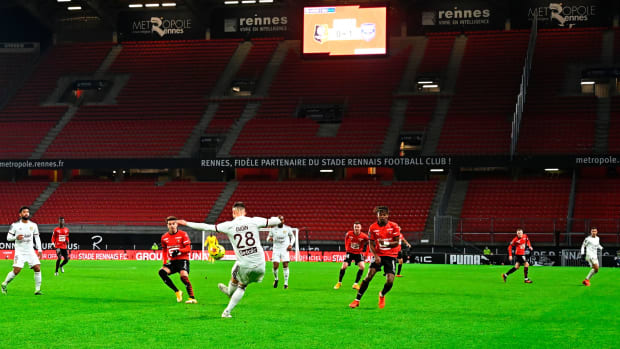Just months into a four-year contract with Mediapro, the French league terminated a deal that was to be worth more than €3 billion.
PARIS (AP) — The collapse of French soccer’s main broadcast rights deal has disrupted teams’ financial plans in already pandemic-hit season just before the global transfer window reopens in January.
As a result, clubs in France’s top-tier Ligue 1 seem more vulnerable than usual to offers for their players from rivals in the four wealthier European soccer nations — England, Germany, Italy and Spain — looking to capitalize on the disarray.
Just months into its four-year contract with broadcaster Mediapro, France’s Ligue de Football Professionnel (LFP) last week terminated a deal that was to be worth more than 3 billion euros ($3.6 billion) for the 20-team top tier.
Mediapro had already missed a scheduled payment in October of 172 million euros ($209 million) to televise games on its new Téléfoot network. Another for 152.5 million euros ($185 million) was not made this month.
Instead, the Spanish agency, majority owned by a Chinese equity fund, agreed with the league to pay 100 million euros ($122 million) and relinquish its rights to games in the top two divisions.
Those rights revert to the league “in the near future,” Mediapro said in a statement. “This agreement will be submitted to the commercial court of Nanterre in the coming days so that it can enter into force as soon as possible.”
Christophe Galtier, the coach of Ligue 1 leader Lille, had grave concerns about the fallout.
“Soccer’s economy is obviously going to find itself in great difficulty. With the COVID-19 crisis and Brexit coming, it’s going to get complicated,” Galtier said. “We have to trust the directors, the authorities and the club presidents to get through this storm, because it’s a real storm.”

The French league, apart from the Qatari state-backed wealth of champion Paris Saint-Germain, is traditionally ripe to have its talent picked by clubs in the big-4 leagues.
Yet offseason signs pointed to promised new television revenue having emboldened Ligue 1 executives and changed the market.
In 2019, French clubs made a net profit of $251 million from sales on international player transfers processed by FIFA, according to the world soccer body’s research.
In the recent offseason, with clubs worldwide counting the cost of empty stadiums and devalued commercial deals due to the coronavirus pandemic, French clubs were net spenders of more than $75 million combined, FIFA said.
That outlay now looks to have been based on shaky foundations.
Galtier was critical of Mediapro and its CEO Jaume Roures, without directly naming him.
“In my eyes the only one responsible is Mediapro,” Galtier said. “We know the one who is responsible. He has a name, a face. He should stop talking and go away.”
Marseille coach Andre Villas-Boas was also angry when the first missed payment was revealed.
“I’ve never seen that in my life,” Villas-Boas said in mid-October. “A guy (Roures) who presents himself as the big savior of French football and now he doesn’t have the money to pay the contract. It’s absurd.”
Téléfoot was created only four months ago and found too few customers for its 25 euros ($30) monthly subscription.
It will soon be shuttered, though its scheduled matches — eight of the 10 from each round of top-tier fixtures — will still be screened on Wednesday, and over the weekend.
Established French broadcaster Canal Plus already had two Ligue 1 games from each round, including the top pick.
Canal Plus looks the likeliest buyer for the LFP’s newly returned rights, though at a significantly lower rate.
Rennes coach Julien Stéphan said he hopes less fortunate clubs than his team, whose long-time owner François Pinault is among the world’s richest people, will not be heavily impacted.
“I just hope that the best solution will be found in everyone’s interests,” Stephan told sports daily L’Equipe, “and that clubs are not in trouble in the near future.”